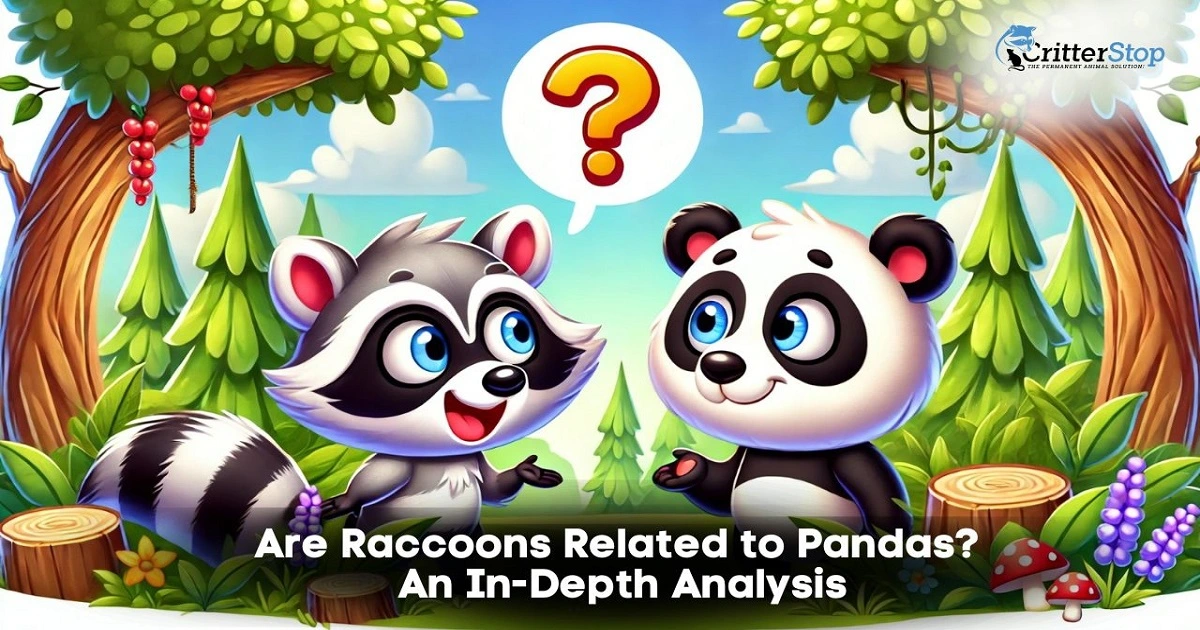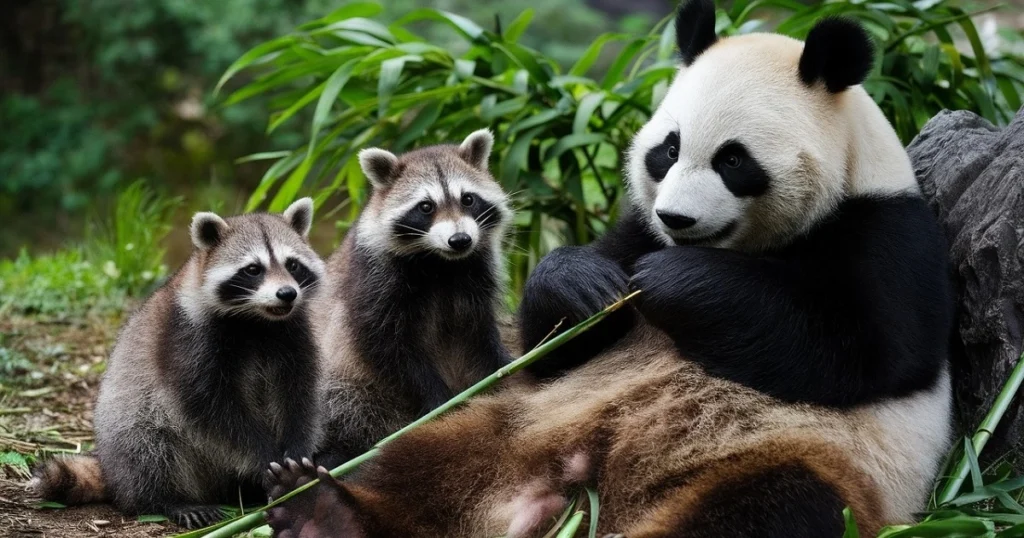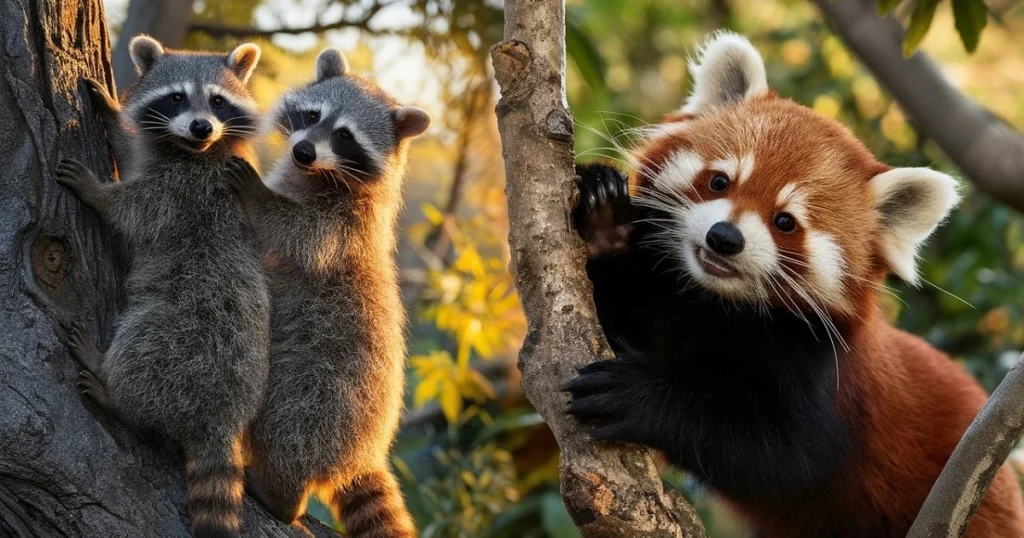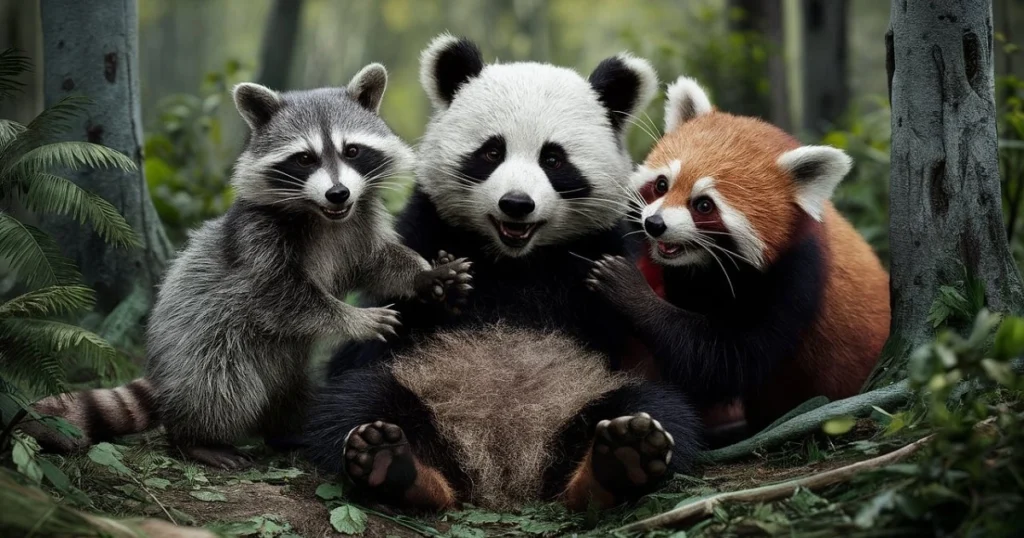
Whether raccoons are related to pandas often arises due to certain physical similarities and behaviors observed in both species. This comprehensive analysis delves into the evolutionary biology, genetic connections, and key differences between raccoons and pandas. By the end of this article, we aim to provide a clear understanding of their relationship and distinctions.

Raccoons belong to the family Procyonidae, while pandas belong to the family Ursidae. These two species are classified under different families despite their superficial resemblances, indicating a distant evolutionary relationship.
Genetic research has revealed that while raccoons and pandas share some common ancestors, their evolutionary paths diverged millions of years ago. The Procyonidae family, which includes raccoons, coatis, and kinkajous, separated from the Ursidae family, which comprises bears, including the giant panda, approximately 30-40 million years ago.
Diet: Pandas are almost exclusively herbivorous, primarily consuming bamboo. Raccoons are omnivorous and have a varied diet that includes fruits, nuts, insects, and small animals.
Some similarities between raccoons and pandas result from convergent evolution, where unrelated species develop similar traits due to similar environmental pressures.
The traits that have evolved in raccoons and pandas serve specific adaptive purposes:

Raccoons play a crucial role in their ecosystems as both predators and scavengers. They help control populations of insects and small animals, and their foraging behavior aids in seed dispersal, promoting plant diversity.
Pandas are considered a keystone species in their habitat. Their feeding behavior helps maintain the health of bamboo forests, which are crucial for the survival of various other species. By consuming large quantities of bamboo, pandas help stimulate new growth, supporting a diverse ecosystem.
Giant pandas are classified as vulnerable, with numerous conservation efforts in place to protect their dwindling population. These efforts include habitat preservation, breeding programs, and international collaborations to ensure their survival.
Although not endangered, Raccoons face threats from habitat destruction and human-wildlife conflicts. Efforts to manage raccoon populations include urban wildlife management programs and public education on coexisting with these adaptable creatures.
Understanding the differences and similarities between raccoons and pandas helps clarify these misconceptions. Acknowledging their unique evolutionary histories and ecological roles can help us appreciate the diversity of life on Earth.
Delving deeper into their family trees is important to fully understanding the relationship between raccoons and pandas. The Procyonidae family, to which raccoons belong, includes species like coatis, olingos, and kinkajous.
This family is characterized by small to medium-sized mammals that are predominantly arboreal and have a high degree of manual dexterity.
Conversely, the Ursidae family, which includes pandas, comprises various bear species such as the brown bear, black bear, and polar bear. Members of this family are generally larger, have more robust bodies, and are adapted to a wide range of habitats from the Arctic to temperate forests.
Molecular studies, such as DNA sequencing and comparative genomics, provide compelling evidence of the divergence between these two families. The genetic distance between raccoons and pandas is significant, reflecting their long, separate evolutionary paths.
These studies have shown that despite some convergent traits, the genetic makeup of these animals is quite distinct, underscoring their classification into different families.
Raccoons are highly adaptable creatures that thrive in a variety of environments. Their omnivorous diet allows them to exploit various food sources, from urban trash cans to forest ecosystems. Key adaptations that facilitate their success include:
Giant pandas have evolved to occupy a unique ecological niche. Their specialized diet and physical adaptations are suited to their habitat in the bamboo forests of China. Key adaptations include:
Raccoons are well-known for their ability to thrive in urban environments. Their adaptability often brings them close contact with humans, leading to positive and negative interactions. Urban raccoons benefit from readily available food sources like garbage and pet food, but they can also become nuisances, causing property damage and spreading diseases.
Pandas face significant challenges due to habitat loss and fragmentation. Conservation efforts are focused on protecting their natural habitat and ensuring sufficient bamboo availability. These efforts include creating wildlife reserves, establishing bamboo corridors to connect fragmented habitats, and engaging in international breeding programs to increase genetic diversity.

The physical resemblance between raccoons and pandas, particularly their facial markings, contributes to the common misconception that they are closely related. Both species have distinctive black markings around their eyes, which serve different purposes but appear similar to the untrained eye.
Media portrayals and popular culture also perpetuate misconceptions about wildlife. Characters in movies, television shows, and books often blur the lines between animal species, leading to a simplified and sometimes inaccurate understanding of animal relationships.
Educating the public about the true nature of animal relationships is crucial for fostering a better understanding of biodiversity and the complexities of evolution. Accurate knowledge helps in making informed decisions about wildlife conservation and management.
Conservation organizations play a vital role in dispelling myths and providing factual information about wildlife. Educational programs, research, and outreach help bridge the gap between scientific knowledge and public awareness.
While raccoons and pandas share some superficial similarities, their genetic, evolutionary, and ecological differences are substantial. Understanding these differences enriches our appreciation of the diversity of life on Earth and highlights the importance of conservation efforts tailored to each species' unique needs.
For professional assistance with wildlife control, including humane removal of raccoons, contact Critter Stop at (214) 234-2616. Critter Stop has a fantastic reputation and online customer reviews because it provides high-quality work and great customer service. They offer free inspections and expert solutions to manage and prevent wildlife problems on your property.
This FAQ section addresses common questions about the relationship between raccoons and pandas, exploring their evolutionary background, behavioral traits, and more. This comprehensive analysis aims to clarify any misconceptions and provide detailed insights.
Raccoons and pandas are not closely related in terms of evolution and genetics. Raccoons belong to the family Procyonidae, while pandas are part of the family Ursidae. Despite some physical similarities, their evolutionary paths diverged millions of years ago, and they are classified under different families.
Red pandas and raccoons have distinct differences in their habitats and diets. Red pandas live in the temperate forests of the Himalayas, primarily eating bamboo. At the same time, raccoons are native to North America and are omnivorous, consuming various foods, including fruits, nuts, insects, and small animals. Their habitats and dietary preferences reflect their unique adaptations to their respective environments.
Scientific research shows that pandas and raccoons are not closely related. Genetic studies have shown that while they share some common ancestors, their evolutionary paths separated approximately 30-40 million years ago. Pandas belong to the bear family, Ursidae, and raccoons to the Procyonidae family, indicating a distant genetic relationship.
In the wild, pandas and raccoons exhibit very different behaviors. Pandas are solitary animals, primarily herbivorous, and spend most of their time eating bamboo. Raccoons, on the other hand, are more social and adaptable, with an omnivorous diet. They are known for their dexterous paws and ability to thrive in various environments, including urban areas.
Raccoons are called trash pandas due to their habit of scavenging through garbage in urban areas. This nickname stems from their resemblance to pandas in terms of facial markings and their foraging behavior, often seen rummaging through trash bins for food. Their adaptability and opportunistic feeding habits have earned them this colloquial moniker.
Raccoons and pandas are not closely related and belong to different families. Raccoons belong to the Procyonidae family, while pandas belong to the Ursidae family. Their evolutionary paths diverged millions of years ago, leading to distinct physical and behavioral characteristics.
In popular culture, raccoons are called trash pandas due to their raccoon-like facial markings and their notorious behavior of rummaging through trash. This nickname humorously highlights their scavenging habits and their resemblance to pandas, making it a memorable and descriptive term.
Red pandas and raccoons would likely avoid direct conflict in their natural habitats. However, if a confrontation were to occur, each animal would have advantages based on their adaptations.
Red pandas are agile climbers with sharp claws, well-suited to their forest environment, while raccoons are more adaptable and resourceful, with dexterous solid paws. Ultimately, the outcome would depend on the specific circumstances and environment.
For expert advice on managing wildlife and pest issues, including the humane removal of raccoons, contact Critter Stop at (214) 234-2616 for a free inspection. Critter Stop has a fantastic reputation and online customer reviews because it provides high-quality work and great customer service.
Visit our Critter Library and learn more about our furry friends